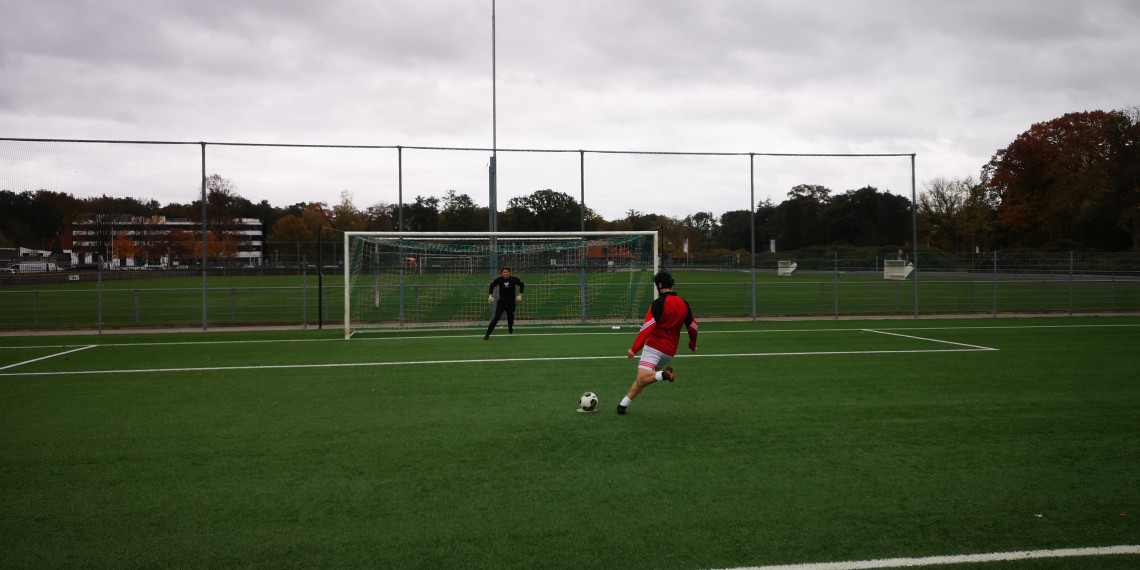Former football player and current sports broadcaster Gary Lineker once said: 'Football is a simple game: 22 men chase a ball for 90 minutes and at the end the Germans always win'. It's a quote to the ears of many a cynic. The football fan knows better: 'The ball is round' is not a platitude, but a masterful metaphor. Football has become the beautiful game because of its culmination of brilliant ball magicians, sharpened athletes and modern gladiators. They come together in football temples where tens of thousands of frenzied fans elevate the game to a true religion. The pitch has as many variables as stories. On that stage, the dividing line between eternal glory and total humiliation is razor-thin.
When it comes to penalties, that adage applies all the more. We Dutch people know that all too well, with the necessary scratches on our souls (thank you, Clarence Seedorf). Whether it's for fun in the 'third half' or for the happiness of 17 million national coaches: no matter how good or bad you played during the game, that one shot from eleven metres is crucial. This is how Slutter's research question arose, he says. 'Penalty kicks are a very strange phenomenon. Top footballers with a perfect kicking technique suddenly fail from 11 metres away, when it should actually be something very simple. In this research I combine my fascination for what happens in the brain with my favourite sport.'
Brain helmet and hand sanitizer
It is high time to take up the challenge myself. Slutter has already appropriated the dug-out on the artificial grass pitch opposite the Sports Centre. Chairs are littered with a laptop, a brain helmet and - a sign of the times - hand sanitizer, gloves and mouth masks. The ball is already on the spot. It's just a matter of time before VV Drienerlo 2 goalkeeper Patrick van Oerle arrives. Slutter already provides the instructions.
The assignment is quite simple: I put on the helmet and take a total of fifteen penalties. Five without a goalkeeper, five with and five in which I am also subjected to the inevitable psychological warfare. Meanwhile Slutter will be measuring my brain activity. His research is a pioneering activity, says Slutter. 'There have been studies where brain activity was measured during sports, but people stood still, like in archery. I haven't found any field research into a game of movement such as football. I work with sensitive equipment and have to watch out for disturbances. Penalties are therefore an ideal test case; there is relatively little movement on the part of the player, so the experiment is easy to define.'
Empty net
The setting is not exactly comparable to match circumstances. No fatigue or pressure put on the shoulders by teammates, opponents or supporters. 'No, it doesn't come close to a full stadium during a final', says the master's student. 'It's a fairly dry observation of what the pressure of taking a penalty kick does to you as a player. The stripped-down setting is also an advantage when you look at the equality in circumstances. Even the artificial turf helps; you don't have to worry about clumps of grass.'
Van Oerle arrives, but is not yet needed for the first series of penalties. Even an empty goal can evoke the necessary nerves, I notice. Certainly in the knowledge that my 'boots' have only caught dust during the now more than two weeks of corona break. I am spared a total failure, all five of them find the net fairly convincingly.
Round two. Goalie Van Oerle reports between the posts and manages to stop the first penalty immediately. Despite all the available equipment, there is no VAR to save me. The conclusion: poorly shot, well rescued. The next four penalty kicks of the series fortunately find the net.
Psychological warfare
Then the third round. Slutter puts a bottle of water near the centre circle. After each penalty I have to walk the long way from the centre to the penalty spot, like the professionals in a tense series. Psychological strike number one. Job van Regteren, head of in-house safety, happens to be in the neighbourhood and makes grateful use of the opportunity to provoke me. Strike two. Slutter puts the pressure on a bit more and challenges me. If I score less than four goals, I will have to confess my failure in this article to the U-Today readers. If I score more, Slutter allows me to use this writing space to bask in the glory. That's not enough pressure yet, because in the walk-up to the first penalty kick it is also clear: Van Oerle could well be the son of Jerzy Dudek and Hans van Breukelen, given his attempts to distract and delay.
The first three penalties: Convincingly in the bottom right corner. And then while walking towards the spot, the doubt sets in, sparked by those present: again aim at that trusty right corner, right? I go for a bit of 360-degree psychology: the goalkeeper never expects me to shoot in the bottom right again. But, because he thinks that's what I think, he'll probably dive into that right corner. So I will aim at the top left corner. The result after that mini mindfuck: the ball hits the crossbar. The extremely mediocre fifth penalty kick forces me to confess: dear readers, I have failed.

'Don't think too much'
Fortunately, Slutter has the required theoretical foundation to support my failure, especially now that he has collected all his data and will soon submit his thesis. 'Your motor cortex is more activated when you have to perform, while your frontal cortex - responsible for long-term thinking - and left temporal cortex - responsible for self-instruction - should be less activated.' During his research Slutter already saw a difference between experienced and inexperienced participants. 'The inexperienced penalty participants relied much more on their left temporal cortex. They performed better and felt less pressured if they activated them more. For experienced players the exact opposite was noticeable.'
In other words: if you're a more experienced player and the motor cortex is running at full throttle, the level of stress will be much lower. Or, as Slutter puts it afterwards: 'Just not thinking too much is perhaps best for footballers.' He's almost done with his research, which opens the doors for further studies: isn't it much better to control the pressure by practising on it? Are there differences between the pros and their army of mental coaches and VV Drienerlo 5? And how can the insights help not only football players, but also surgeons, for example? We'd like to experience it up close. In the meantime, after the corona break, I won't immediately volunteer the next time the ball lands on the penalty spot.







